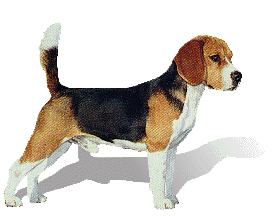
The Origin of the Beagle
Research reveals reference to the hounds which are without doubt the ancestors of our Beagles coming from the Greeks as far back as 400 B.C. The little dogs were as popular then as they are now, and this popularity helped them to become established in ancient Britain around 200 A.D. Beagle-type hounds were also known in Italy during this same period, very likely having been brought there from Greece. Some of these almost certainly made their way to the British Isles during the Roman occupation, but who is to say whether the little dogs were introduced there by the Romans or their numbers simply augmented? Indications point to there having been packs of small hounds used for hunting in Britain both prior to and following the Roman invasion. Predecessors of our Beagles are noted as having been popular in England when the Forest Laws of King Canute were drawn up in 1016 A.D. Dogs which apparently were Beagles had been brought to France when Aquitaine and Guienne were British provinces. By the fourteenth centuary Beagles had become known in Greece, Britain, Italy, and France. Talbots, large white hounds brought to England by William the Conqueror, are believed to have played a part in the development of the modern Beagle. These dogs are known to have been forebears of the Southern hound, a dog involved in the development of the Foxhound and thereby of the Beagle. The name "Beagle" is thought to come from the Celtic word 'beag' meaning small.